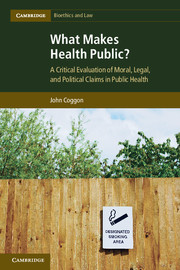 What Makes Health Public?
What Makes Health Public? Book contents
- Frontmatter
- Contents
- Foreword
- Acknowledgements
- What makes health public?
- Part I Basic concepts in public health
- 1 Health, normativity, and politics
- 2 The public, and things being public
- 3 The seven faces of public health
- 4 Public health policy
- 5 Public health law and ethics
- 6 Conclusion to Part I
- Part II Evaluating evaluations: making health public
- Part III Tackling responsibility: liberal citizens as subjects and sovereigns
- Bibliography
- Index
- References
5 - Public health law and ethics
from Part I - Basic concepts in public health
Published online by Cambridge University Press: 05 June 2012
- Frontmatter
- Contents
- Foreword
- Acknowledgements
- What makes health public?
- Part I Basic concepts in public health
- 1 Health, normativity, and politics
- 2 The public, and things being public
- 3 The seven faces of public health
- 4 Public health policy
- 5 Public health law and ethics
- 6 Conclusion to Part I
- Part II Evaluating evaluations: making health public
- Part III Tackling responsibility: liberal citizens as subjects and sovereigns
- Bibliography
- Index
- References
Summary
Marking out fields without boundaries?
This chapter addresses questions of what we should take ‘public health law’ and ‘public health ethics’ to mean. I will consider each, but first it is worth addressing the question of “coherence anxiety”, which seems necessarily to obstruct analysts claiming to focus their attention in these areas. “Medical law”, “health care law”, “health law”, and “public health law”, have all for some time been cordoned off into discrete but unconventional areas of analytic focus. All of them can be seen to fall under the wider umbrella of bioethics, which has been defined as “the study of ethical, social, legal, philosophical and other related issues arising in health care and the biological sciences”. We can allow too that they may be about more than just study; that as well as developing theory, they may be concerned with policy-making. The upshot is that we find a peculiar approach to formulating a discipline. Rather than drawing boundaries in accordance with categorically distinct doctrines – such as tort, contract, crime, human rights – a doctrinally irrelevant common nexus, namely health, binds together different disciplines, and different approaches from within disciplines. Health-related matters are key. Given this, public health law might include any form of law that bears on health. There is a lack of orthodoxy to this approach. For it to be worthwhile, one has to accept the claim that health itself is sufficiently important that it warrants attention from a doctrinally disparate perspective. And notably, health law and public health law seem to open themselves up to ‘coherence problems’ that need not apply to medical law – i.e. the law governing medical practice – and perhaps also healthcare law.
Even if health is a contested concept, however, it arguably is worthy of privileged treatment, and it is such in a manner both for those who consider it to be of fundamental importance, and for those who consider that it ought not to be of any (or of no more than very limited) concern of the State. Possibly we should also add the practical consideration that as many people think they are interested in public health law, this gives sufficient reason to focus on it, notwithstanding any scepticism about its naturally forming a coherent system of study. Public health commitments are becoming of relevance and interest in both public and academic debate. Those who think health ought to be a priority might share Lawrence Gostin’s view that its special importance makes it a proper focus of study and policy formulation:
The health of individuals, families, and communities has deep, intuitive meaning. So much of what we aspire to be as individuals or as members of society relies on health. Our shared intuitions about the value of health manifest themselves in public and political concerns. The media widely reports threats to the public’s health, such as a traveler with multi-drug resistant tuberculosis, E-coli from contaminated spinach, miners’ deaths, unsafe children’s toys, and dangerous pharmaceuticals. Election years predictably spur new, or refashioned, proposals for health care reform. And there remain enduring, intractable health hazards, such as tobacco, obesity, motor vehicle crashes, and endemic diseases such HIV/AIDS.
In contrast with the thrust of Gostin’s work, others may be concerned that health is used as a cover for State tyranny. For these, a focus on measures ostensibly legitimised by their relationship to health protection or promotion is necessary in order to expose instances of the State acting without its competence. “The roads to unfreedom are many” writes Petr Skrabanek. “Signposts on one of them bears the inscription HEALTH FOR ALL.”
- Type
- Chapter
- Information
- What Makes Health Public?A Critical Evaluation of Moral, Legal, and Political Claims in Public Health, pp. 83 - 94Publisher: Cambridge University PressPrint publication year: 2012


